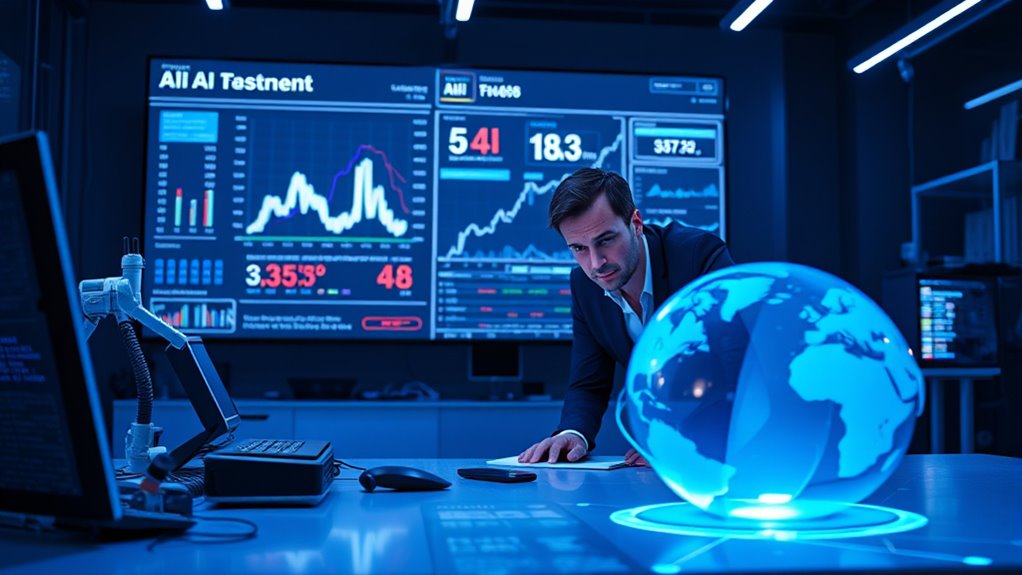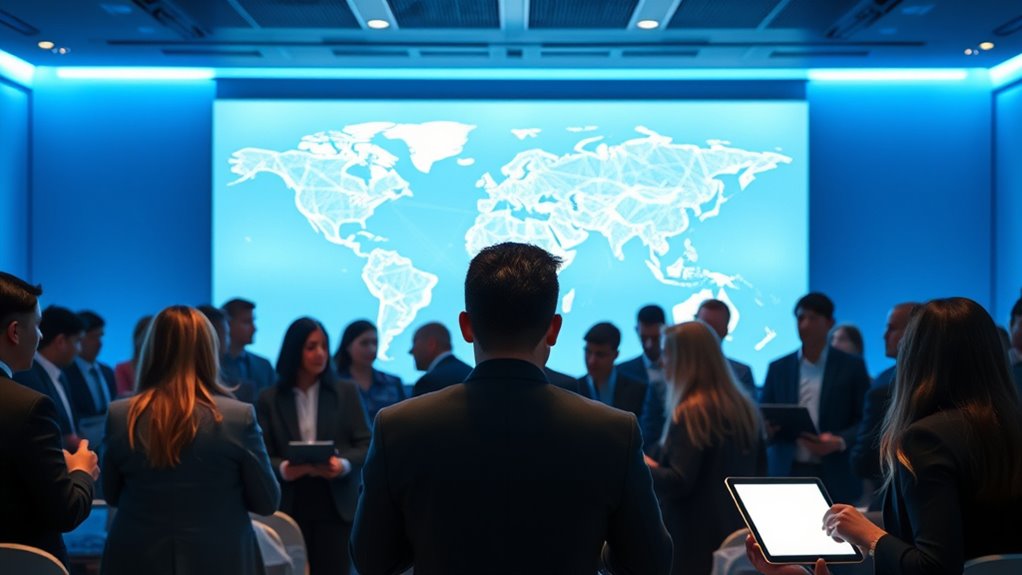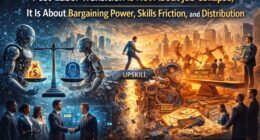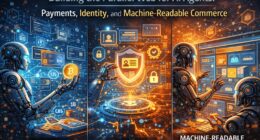Sam Altman’s billion-dollar AI investments aim to revolutionize the global economy by advancing powerful models like GPT-3 and ChatGPT, making AI accessible worldwide. His focus on societal benefits and structuring AI development to prevent monopolies could lead to major shifts in industries, jobs, and economic power dynamics. These moves might upend traditional markets or create new opportunities. If you want to understand how his bold plan could reshape our future, keep exploring these developments.
Key Takeaways
- OpenAI’s breakthrough AI models like GPT-3 and ChatGPT are transforming industries, impacting global labor markets and economic productivity.
- Sam Altman’s leadership accelerates AI development, potentially leading to widespread automation and economic disruption.
- The hybrid, capped-profit structure enables large-scale AI investments, fostering innovations with significant market implications.
- AI advancements under Altman could challenge existing business models, reshape competitive dynamics, and influence global economic power balances.
- Rapid AI progress may raise societal and regulatory challenges, affecting economic stability and prompting policy shifts worldwide.

Sam Altman’s journey from a teenage tech enthusiast to a billionaire AI pioneer is proof of bold vision and strategic risk-taking. Born in 1985 in Chicago and raised in St. Louis, you could say his early exposure to computing at age eight set the stage for a future in innovation. Dropping out of Stanford after two years studying computer science didn’t slow him down; instead, he founded Loopt, a mobile social networking startup that raised over $30 million. His knack for fundraising, sales, and articulating visions of technological progress quickly earned him a reputation in Silicon Valley. When he joined Y Combinator in 2011 and later served as its president, he helped shape the startup culture that fuels tech giants today.
In 2015, Altman co-founded OpenAI as a nonprofit with Elon Musk and others, aiming to develop AI that benefits all humanity. With a billion-dollar backing from founders, Peter Thiel, Amazon Web Services, and more, the organization’s mission was to prevent AI power from consolidating among a few companies while promoting transparency. Altman envisioned the project as a grand-scale effort, comparable to the Manhattan Project for its potential impact. Musk’s departure in 2018 prompted Altman to steer OpenAI toward a hybrid model—blending nonprofit governance with a for-profit arm that uses a capped-profit structure. This innovative approach balances the pursuit of profit with the organization’s core mission of societal benefit.
Partnering with Microsoft, which invested heavily and took nearly half ownership, Altman secured the resources needed for large-scale AI development. Under his leadership, OpenAI launched breakthrough models like GPT-2, GPT-3, and ChatGPT, which made advanced AI accessible to the masses and transformed industries worldwide. These innovations have pushed natural language processing and machine learning into the mainstream, influencing the strategies of tech giants and accelerating the development of artificial general intelligence. This bold strategy has positioned Altman as a central figure shaping the future of AI and its role in the global economy. Additionally, the increasing capabilities of AI systems underscore the importance of understanding the societal implications discussed in AI research and policy circles.
Top picks for "altman billion dollar"
Open Amazon search results for this keyword.
As an affiliate, we earn on qualifying purchases.
Frequently Asked Questions
How Will AI Impact Job Markets Worldwide?
AI will reshape job markets worldwide by displacing around 9.1% of jobs, especially in sectors like writing and software development. You’ll see some roles decline, but new jobs will emerge, particularly in tech-related fields. To stay ahead, you’ll need to upskill and adapt, as AI-driven changes create opportunities but also require you to acquire new skills. The economy will transform, demanding continuous learning and flexibility from workers globally.
What Are the Ethical Concerns Surrounding AI Development?
You should be aware that ethical concerns in AI development include biases that can lead to discrimination, privacy violations from data collection, and lack of transparency in decision-making. You also need to contemplate environmental impacts, fairness, accountability, and the risk of misinformation. Ensuring responsible development, continuous monitoring, and inclusive governance helps address these worries. By prioritizing these factors, you can help create AI systems that are fair, trustworthy, and ethically sound.
How Might AI Influence Global Political Stability?
You might find AI influencing global political stability through increased cyber threats, misinformation, and automation impacts. As AI enables sophisticated cyberattacks and spreads disinformation, governments could face unrest or destabilization. If nations struggle to regulate AI effectively, conflicts may escalate, risking geopolitical tensions. Conversely, collaboration on AI safety standards could promote stability. Your role involves understanding these risks and supporting policies that guarantee AI enhances, rather than undermines, political harmony worldwide.
Who Are the Key Competitors in AI Advancements?
You should watch OpenAI, xAI, DeepL, and Anthropic as key competitors driving AI advancements. OpenAI leads with advanced language models, while Elon Musk’s xAI pushes multimodal reasoning with Grok-3. DeepL and Anthropic focus on language processing and safe AI. Additionally, companies like Mistral AI, ElevenLabs, and MIT startups innovate in specialized AI fields. Major tech giants like Palantir, SoundHound, and AppLovin also compete by integrating AI into enterprise, voice, and consumer tech.
What Regulations Could Governments Implement for AI Safety?
You should consider how governments might implement regulations like mandatory safety standards, incident reporting, and whistleblower protections to guarantee AI safety. They could establish sector-specific laws for healthcare, employment, or elections, and promote transparency through publishing frameworks and requiring compliance. Additionally, international cooperation might lead to global guidelines, while civil penalties could enforce accountability. These measures aim to manage risks and foster responsible AI development across industries.
Conclusion
Your future could change as AI continues to evolve, much like how a small startup used AI to streamline customer service, boosting profits and transforming their business. Sam Altman’s billion-dollar investment isn’t just about tech; it’s about shaping how we work, communicate, and live. As AI becomes more integrated, you might find smarter tools at your fingertips—making everyday tasks easier or even creating new opportunities you hadn’t imagined. The revolution is just beginning.








